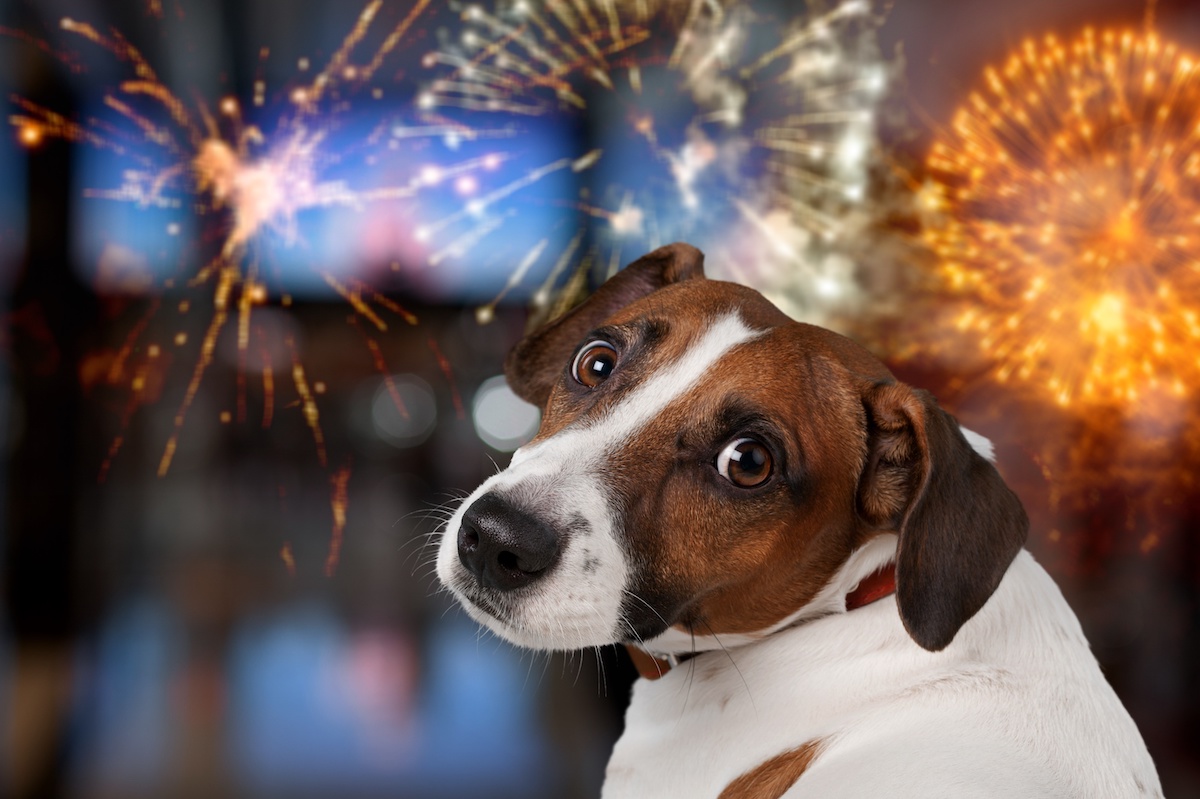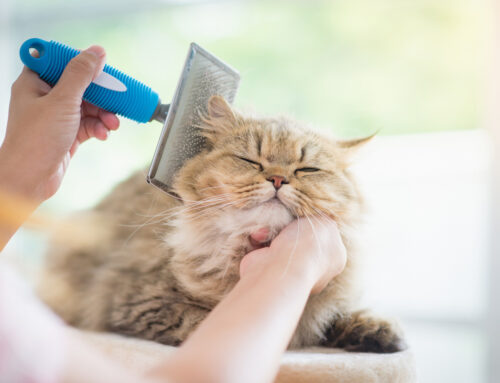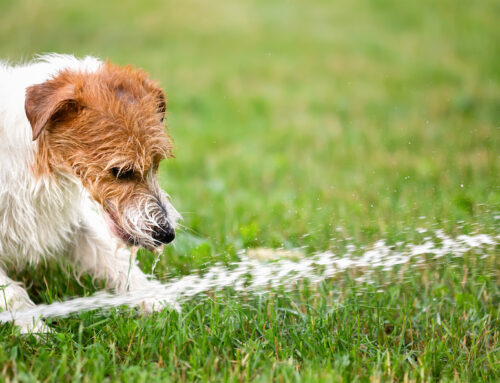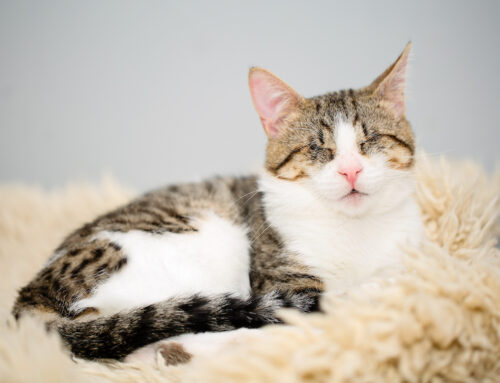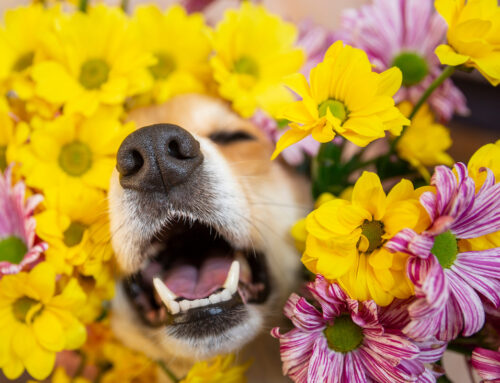Does your cat or dog dread the sights and sounds of fireworks? Big booms and sudden flashes can be quite distressing for our canine friends. Many pet parents come to us at Animal Care Center for advice on how to keep pets calm during fireworks. The good news is that there are several options to help.
If you believe that your pet needs extra help on their fear of fireworks, please contact our office as soon as possible.
What Makes Dogs Fearful of Fireworks?
Ever wondered why dogs find fireworks so intimidating? It’s primarily due to the loud, sudden noises and the erratic nature of these vibrant skyward explosions. Dogs possess acute hearing sensitivity, making the roaring booms and sizzling crackles absolutely petrifying for them.
How to Spot Fear in Dogs
Our canine pals exhibit a range of fear and anxiety signs when fireworks come into play. These noticeable signs signify that your dog is upset and requires your immediate attention:
- Rapid Breathing
- Restlessness
- Shivering
- Seeking Shelter
- Excessive barking
- Damaging property
While individual dogs may show varying fear behaviors, these signs are generally common indicators of distress.
Addressing their fear is vital, as unattended anxiety can negatively affect their health and overall happiness. Ensure to implement necessary measures to soothe their fears and maintain their calm during fireworks.
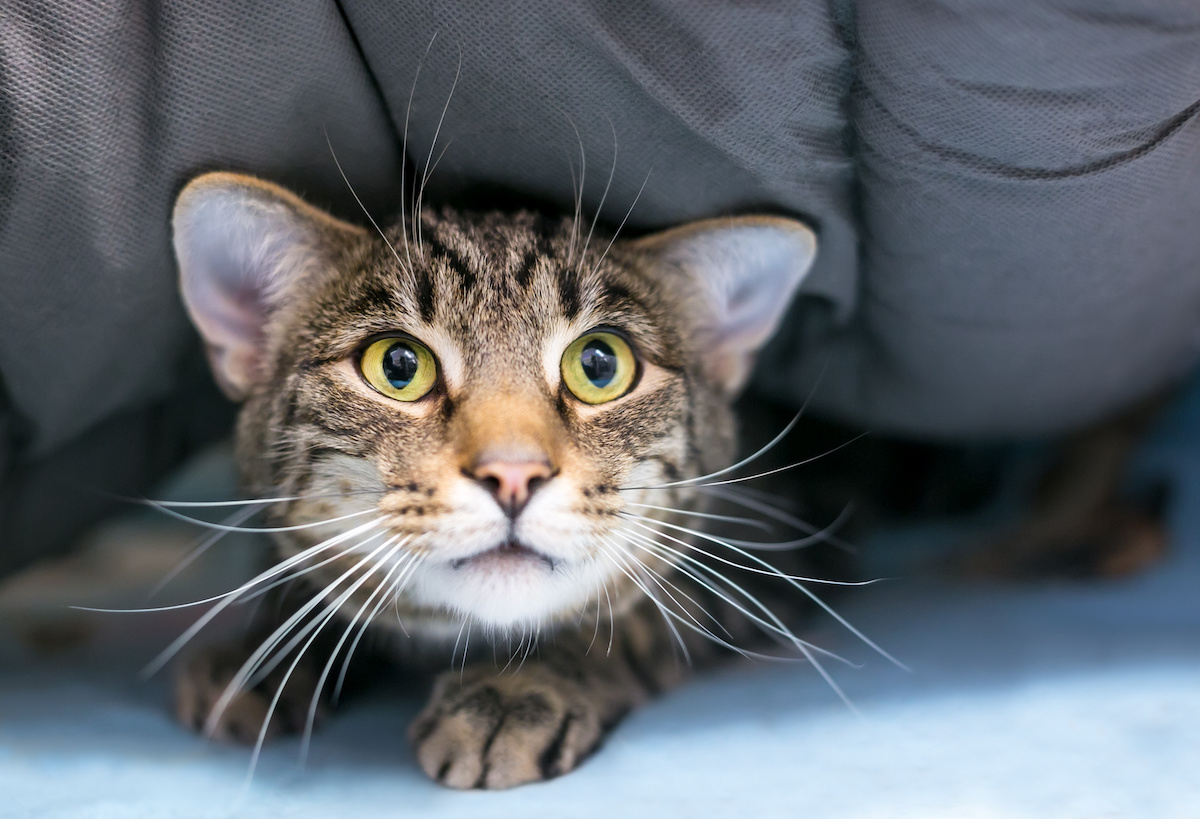
Are Cats Afraid of Fireworks?
Yes, just like their canine counterparts. The sudden, loud noises coupled with bright, unexpected flashes of light can be overwhelming for our feline friends. Cats have keen senses, particularly vision, and can find the explosive sounds of fireworks quite unnerving.
Meanwhile, cats naturally prefer quieter environments and are creatures of routine and consistency. Fireworks disrupt both of these comfort zones, leading to increased anxiety and stress. When a fireworks display occurs, cats can become disoriented and frightened by the loud, unpredictable noise and the sudden changes in their environment.
Signs of a Scaredy Cat
One noticeable reaction from a scared cat is that they will often retreat to a hiding place. You may find them under a piece of furniture, behind an appliance, or in a dark corner. They may also display other signs of fear such as excessive grooming, reduced appetite, or changes in their usual behavior.
Moreover, cats are generally more independent and better at hiding their fear than dogs. This is why it’s important to provide a safe, comforting space for them during fireworks. Work on providing hiding places, limiting exposure to the noise, and trying to maintain a calm environment overall.
As responsible pet owners, it’s crucial to ensure that cats feel safe and secure. This is especially true during events that may cause distress, such as a fireworks display.
Preparing Your Pets for Fireworks
Create a safe space
Designate a quiet, secure area in your home where your pet can retreat when frightened. Make it comfortable with familiar bedding, toys, and maybe a favorite piece of your clothing.
Safe Space Ideas for Pets
Creating a safe space for your pet during the fireworks involves providing a calm and comforting environment. Here are some examples:
- Quiet Room: Choose a quiet room in your home that is far from windows and exterior doors. This could be a laundry room, bathroom, or walk-in closet, for instance.
- Crates: If your pet is crate trained and finds comfort in it, the crate can become a safe space. Enhance the comfort by adding blankets and a few favorite toys.
- Under Furniture: Some pets, especially cats, find safety under furniture. Clear out space under a bed or couch, and place a soft blanket there for added comfort.
- Secluded Corner: Designate a secluded corner in a quiet room. Add a pet bed, some toys, and blankets to make it cozy.
- Pet Tent or Teepee: A pet tent or teepee can create a comforting den-like environment. These are especially suitable for pets that enjoy enclosed spaces.
- Covered Crate or Kennel: For dogs that are crate trained, covering the crate with a light blanket can make it feel more secure and den-like.
- Cat Tree or Elevated Space: Many cats feel safer in elevated spaces. If you have a cat tree or any form of elevated platform, this can serve as a safe space for cats.
Provide hiding places for cats
Cats prefer to hide when scared. Make sure there are plenty of hiding spots available, such as cardboard boxes or spaces beneath furniture.
Soundproof the area
Close windows, draw curtains, and use sound-dampening materials to reduce the noise. Playing soft music or white noise can also help mask the sound of fireworks.
During the Fireworks
We gave ideas on what to do before the fireworks. But how can you keep your pets calm during fireworks as well? Here is how to keep pets calm during fireworks:
-
Stay calm and act normally: Your pet takes cues from you. Displaying calm behavior can help reassure them.
- Comfort your pet: Spend time with your pet during the fireworks to provide comfort. However, don’t force them to interact if they prefer to hide. Give them the space they need.
- Distract your pet: Engage your pet with their favorite toys, puzzles, or treats to take their mind off the fireworks.
- Use calming aids: Consider using pet-safe pheromone diffusers, calming sprays, or anxiety wraps. Always consult with your vet before trying new products or techniques.
After the Fireworks
When the firework show is complete, there’s still work to do. Here is how to make sure your cat or dog’s night ends on a quiet, safe note:
- Reward calm behavior: Rewarding your pet for calm behavior after the fireworks can help them associate the experience with positive outcomes.
- Maintain a regular routine: After the fireworks, try to quickly return to your pet’s regular routine to provide a sense of normalcy.
- Seek professional help if needed: If your pet seems particularly distressed, consult a vet or animal behaviorist for professional advice.
How Can a Veterinarian Help Keep Your Pets Calm During Fireworks?
Veterinarians can play a vital role in helping manage your pet’s fear of fireworks. They possess the knowledge and experience to provide custom advice for your pet. Here’s how a veterinarian can assist in keeping your pets calm during fireworks.
Behavioral therapies
If your pet’s fear is extreme, a veterinarian can refer you to an animal behaviorist. They can provide specific behavioral modification techniques to help your pet cope with fireworks.
Medication
In some cases, pets might need medication to help manage their fear and anxiety during fireworks. Veterinarians can prescribe these medications and provide guidelines on dosage and administration. They can also monitor your pet’s response to the medication and make necessary adjustments. This is why it’s important to call us before the 4th of July is here!
Calming products
There are various calming products available that can help keep pets calm during fireworks. Some ideas include pheromone diffusers, calming sprays, and anxiety wraps. A veterinarian can recommend suitable products for your pet and provide guidance on their proper use.
Follow-up and monitoring
After the fireworks, a veterinarian can assess your pet’s reaction and make adjustments to their treatment plan if necessary. They can also provide guidance on long-term strategies to help manage your pet’s fear of fireworks.
How to Keep Pets Calm During Fireworks: Contact Animal Care Center
If you need help keeping pets calm during fireworks, Animal Care Center is here to help. Please contact us to help make your pet’s night pleasant rather than petrifying!

